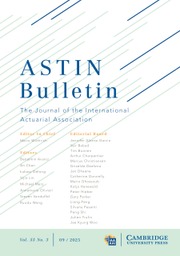Article contents
A NEW INFERENCE STRATEGY FOR GENERAL POPULATION MORTALITY TABLES
Published online by Cambridge University Press: 17 April 2020
Abstract
We propose a new inference strategy for general population mortality tables based on annual population and death estimates, completed by monthly birth counts. We rely on a deterministic population dynamics model and establish formulas that link the death rates to be estimated with the observables at hand. The inference algorithm takes the form of a recursive and implicit scheme for computing death rate estimates. This paper demonstrates both theoretically and numerically the efficiency of using additional monthly birth counts for appropriately computing annual mortality tables. As a main result, the improved mortality estimators show better features, including the fact that previous anomalies in the form of isolated cohort effects disappear, which confirms from a mathematical perspective the previous contributions by Richards, Cairns et al., and Boumezoued.
MSC classification
Information
- Type
- Research Article
- Information
- Copyright
- © Astin Bulletin 2020
References
- 3
- Cited by

